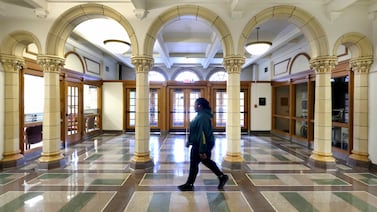Bluntly stating that the Adams 14 school district cannot improve itself, a state review panel has recommended the state close the main high school and reorganize the district. Schools could be consolidated or other districts might step in to manage Adams 14.
“There is evidence of lack of leadership capacity and stability at the district’s highest levels to lead turnaround work effectively to increase student achievement gains,” the panel’s recommendations state. “Additionally, Adams City High School continues to perform at a low level and there is a lack of a prioritized plan for the school and its students, who likely have better options that are geographically close [to] their homes.”
The report obtained by Chalkbeat on Tuesday suggests closing Adams City High School, the district’s only comprehensive high school, and possibly other schools, to allow the district to focus on fewer grade levels while the state comes up with a reorganization plan.
The recommendation suggests that Adams City High School students might fare better if they attended higher-performing schools in neighboring districts.
The panel included six educators including a consultant, some current superintendents, and a former assistant superintendent. Colorado’s State Board of Education will consider the recommendations, as well as those from the education department staff, the district’s own proposal, and public comment at a hearing next month.
Colorado has never intervened to this extent in a struggling school district. There are many questions about how it would work.
The Adams 14 school district is likely to push back hard against relinquishing any autonomy.
The district is working on a proposal to improve itself by creating at least one community school, which would offer an array of social services for students and families. The State Board of Education has not indicated how receptive it would be to that idea.
District officials did not respond to a request for comment about the panel’s recommendations, but Joe Salazar, an attorney working with the district, said that the district sent a rebuttal to the state criticizing the recommendations, in particular for failing to distinguish between the leadership of the district’s former private manager, MGT Consulting, and the new superintendent’s leadership.
The district hired Karla Loria as Adams 14’s superintendent in May and she began work in June, but Salazar argues that Loria didn’t have any authority until MGT left the district in February, and therefore shouldn’t be held accountable for any shortcomings in leadership before that. Under Loria’s direction, Adams 14 locked MGT employees out of the district several times.
Jason Malmberg, president of the district’s teachers union, said that the panel should have considered emails the district tried to provide that show that Loria had no authority. Malmberg said he often called her on various issues and was told he had to talk to MGT.
Malmberg is also concerned that the panel was made up of people from outside the district who don’t understand all the local issues students face. And he said that when the panel finally hosted a meeting with parents, technical issues meant many parents didn’t stay to give their thoughts.
The Adams 14 district serves more than 6,000 students in the working-class areas north of Denver and has received failing ratings from the state for at least a decade.
The state had already made Adams 14 the first district required to hand over management to an outside group to improve student achievement. But the district and its manager, MGT Consulting, abruptly cut ties earlier this year. So the State Board of Education set a hearing to decide on a new improvement plan.
As required by law, a state review panel of outside experts visited the district twice, in February, interviewed staff and community members, and compiled recommendations.
The panel’s report notes the group was concerned about the district’s leadership, and about a division among the community.
Specifically, “the gravest concerns are the reported culture of fear and retaliation, the lack of sound financial and human resource practices, and the overall limited improvement in student achievement and growth over many years.”
The state has limited options for directing the district. The law allows the state to close a school, turn it into a charter school, grant waivers and autonomy to implement its own plan, and partially or totally hand over school or district management to an outside group. The state can also dissolve or consolidate a district, but it has never done so.
The review panel’s report notes some of the many open questions about taking unprecedented steps.
“In order for consolidation to be an option, the [state review panel] recognizes that there are neighboring districts that are performing at higher levels and may be viable options for students. However, this option would require the local board of education in neighboring districts to agree,” the report states.
State law outlines a general process for reorganization that requires a planning committee to craft a plan for how to change district boundaries. It could include creating new or dissolving existing districts, but must get agreement from a majority of committee members and approval from the state’s education commissioner.
As an alternative, the report suggests that neighboring districts instead become partners to support Adams 14 in its turnaround work. That idea came up when the panel held a focus group with leaders of the nearby districts who were described as having an “initial hesitancy” to absorbing Adams 14 students. But the report questions who would be held accountable in a partnership scenario.
“While partners indicated they are willing to provide support to the district, it is not clear if there are local partners who are willing to be held accountable for the work occurring in Adams 14.”
Before Adams 14 hired MGT Consulting, the district had proposed partnering with the neighboring Mapleton Public Schools. The State Board of Education at the time rejected the district’s plan, unless the districts agreed to add another group to help Mapleton do the work. But talks between the districts broke down.
The state review panel also noted that a reorganization or consolidation would require a plan for transition.
“Creating a lack of stability at the school level could be more detrimental to students and families if not done well and without the appropriate expertise,” the report stated. The report also suggested creating a new board.
“The creation of and/or appointment of a separate board composed of local peers/experts to lead and oversee the district leadership and its roles and responsibilities … may provide the accountability required to show improvements,” the report states. “This would also allow for any major leadership changes and reorganization to occur on a smaller scale and to begin more swiftly and thoughtfully than a large district reorganization or consolidation.”
Adams 14 is already suing the state to change the rules for the hearing next month. The district’s lawsuit, in part, takes issue with the State Review Panel and the data it might have considered.
Salazar has been vocal about questioning the state’s authority to take control away from the locally elected school board and the superintendent it hired.
The hearing next month will also consider separate recommendations for Central Elementary, one of the district’s lowest-performing schools which could face its own orders for improvement apart from the district. A separate state review panel is drafting recommendations for the school.
Read the State Review Panel’s recommendations here:
Read the district’s response here:
Correction: A previous version of this story included outdated information about the reorganization process. The law does not require an election to approve a plan for Adams 14.
Yesenia Robles is a reporter for Chalkbeat Colorado covering K-12 school districts and multilingual education. Contact Yesenia at yrobles@chalkbeat.org.






